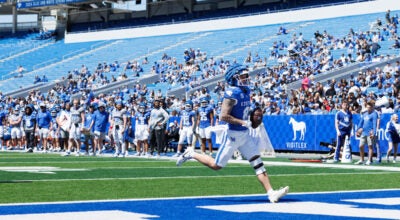Kentucky receives $71K grant to loan temporary portable ramps
Published 8:26 am Tuesday, December 19, 2017
KY ED AND WORKFORCE DEVELOPMENT
News release
FRANKFORT — The Kentucky Assistive Technology Services (KATS) Network can now loan temporary portable ramps to help people with disabilities awaiting a permanent ramp to access their homes. The Ramp Up Kentucky! program is funded through a recently awarded $71,257 High Impact Innovative Assistive Technology (HIIAT) grant from the Christopher and Dana Reeve Foundation.
“Ramp Up Kentucky! seeks to provide some relief to help these individuals have a safe way to enter and leave their homes,” said Jimmy Brown, KATS Network program coordinator and project manager. “Permanent ramps are expensive and can take time to install so portable ramps are a good alternative until a permanent ramp can be built.”
People interested in getting a ramp can contact Brown at 1-800-327-5287 or email him at JamesA.Brown@ky.gov or fill out an application online at www.katsnet.org/rampup.
The portable aluminum ramps will be loaned to Kentucky residents at no cost for up to 180 days during which KATS will provide assistance in locating resources for those needing a permanent solution. Then the ramp will be returned to the distribution center for other users. Brown said aluminum ramps cost between $150 – $850 each depending on the length and are a good alternative for people who may have to wait for up to a year for permanent wooden ramps that cost between $3,500 – $8,000 each depending on the length. The KATS Network also will provide information and assistance to help borrowers locate funding sources for permanent ramps.
Brown estimates that the program will serve about 250 Kentuckians who otherwise would not be able to access their homes because they use wheelchairs or have other difficulties with steps.
“By loaning ramps, people can go home from hospitals and nursing homes quicker, and prevent admittance into long-term care facilities,” Brown said. “It allows more people to stay in their homes and reduces the risk of injury or re-injury.”
Brown said he recently received a call from a social worker at a long-term care center about a patient who can return home but she needs a ramp to access her home. “If she were to be put on a waiting list for a permanent ramp, she could have to wait for more than a year to go home, whereas with one of these loaner ramps, she could go home immediately. That’s a significant savings, well beyond the cost of the ramp.”
According to the 2015 American Community Survey of the U.S. Census Bureau, 416,155 individuals or nearly 9 percent of Kentuckians have difficulty walking and may have difficulty entering and exiting their homes because of steps or curbs.
In addition to purchasing and distributing portable ramps, the Ramp Up Kentucky! program will give ramp-building kits to Kentuckians with difficulties accessing their homes. To receive a ramp-building kit, the consumer has to agree to purchase lumber and other building materials to build the ramp. Unlike the portable ramps, the ramp-building kits become the property of the consumer and are not returned to the distribution center.
Sheila Levy, KATS Network outreach coordinator, said, “Individuals with physical limitations will be able to gain more independence and get out into their communities, relieving their sense of isolation.”
The KATS Network is in the Kentucky Office for Vocational Rehabilitation (OVR) in the Education and Workforce Development Cabinet. For more information about the KATS Network, visit http://www.katsnet.org/.






